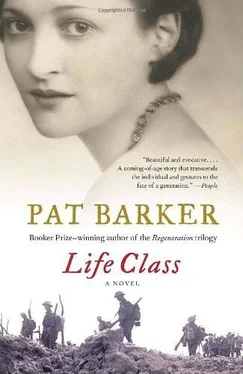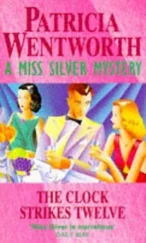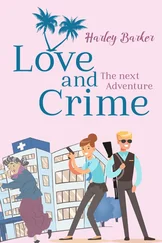Speaking of places, picture me in an Islington workhouse. There, that’s a challenge, isn’t it? The day before yesterday Catherine’s mother said she was too ill to go on the fortnightly visit to Catherine’s father, so Catherine was faced with going on her own. ‘I’m dreading it,’ she said, so of course I offered to go with her. We sat on the top of the bus in a slight drizzle, our knees safely tucked away under the rain apron. Catherine said what a relief it was to be back in London where nobody knew them. I was determined to make her laugh or smile at least and I did, several times, but then we got close and she went quiet.
It was only a short walk from the bus stop to the workhouse. Oh God, Paul, what a place. I thought of all the people over the years who’d dreaded going in through that door, how it must have seemed like the end of everything and been the end of everything, and it’s exactly the same now. We were kept waiting a long time. A long time. Perhaps unavoidably, but I don’t know — there was a whiff of little-minded people with a lot of power. Catherine had brought a cake with greaseproof paper wrapped round it and she sat cradling it like a baby. The room was packed. Children, wives, mothers, no men of course — no boys over the age of fourteen. When the big doors opened Catherine went in alone. I sat there and tried to take it in. Ugh, the smell. Gravy, sweaty socks, drains, oh and on top of it all, Condy’s Fluid. What would we do without it? I heard a woman sobbing and tried to look round the door, I was afraid it was Catherine, but it wasn’t. People were exchanging gifts. Some of the internees had made wooden toys for their children. One elderly couple simply sat and looked at each other across the table, holding hands, not speaking.
The visit lasted an hour. I started sketching and one of the guards came up and told me to stop. Of course I asked why and he didn’t have an answer, but I still had to stop. Then at last Catherine came back holding a letter rack her father had made for her mother. She was crying and laughing at once. ‘I don’t know what use he thinks this is going to be,’ she said. ‘Nobody writes to us any more.’
I can’t get it out of my mind. The papers are full of it, all the time now — the enemy within. The enemy within is Catherine’s father, a dentist, for God’s sake, who never hurt anybody (well, you know what I mean!), and he’s locked up ‘for the duration of hostilities’ without a trial or anything. If this is the kind of thing that can happen, what are we fighting for?
Paul to Elinor
If you ever again hear me complain about things being too quiet will you please hit me over the head with a large blunt instrument — a book, or a doorstop or a sculptor’s mallet would do. Last night I was leaving a CCS — a Casualty Clearing Station — when I heard a screech followed by a crash. The man ahead of me fell and lay spread-eagled on the ground. Another shell landed, sending debris cascading across the roof; then another. This particular station’s in the cellar of a ruined farmhouse. A cloud of dust billowed up into the air. I was rooted to the spot. When I tried to run I found my knees had turned to jelly. A very strange sensation because my mind was quite calm. At the entrance to the station, I ran full tilt into one of the other drivers trying to get out. One of the barns at the back of the building had been demolished, but the clearing station itself was still intact, full of wounded men stumbling about, hair and eyelids crusted with plaster dust. Poor devils, that was the last thing they needed. But the surgeons went on operating, though the lights swung from side to side and the shadows rocked.
Elinor to Paul
I asked Lady O if I could bring Catherine to her Thursday night party and of course she said yes. Catherine came round to my place first and we got dressed up and set off to walk to Bedford Square. Streets rather quiet. It’s the full moon and London’s expecting to be bombed. You can feel it everywhere, the tension, the watchfulness, the excitement. The few people who venture out after dark keep looking up at the full moon — and so the war makes werewolves of us all.
We arrived at the house and were shown into the drawing room where a man was playing a pianola, and Lady Ottoline was standing over a huge box in the middle of the floor holding up a purple feather boa. ‘Who wants this?’ she boomed, and handed it to a tall etiolated man with a straggly beard who wrapped it around his neck and immediately started to dance a minuet — though the music was nothing like that. Gradually others joined in. Ottoline, looking rather splendid and baroque, kissed me and greeted Catherine very kindly. Catherine blushed and stammered and when Ottoline had moved on looked astounded. ‘I did warn you,’ I said. I got a gypsy shawl from the box and Catherine a fan, and we started to dance a tarantella. When I stopped to get my breath I was seized by a man who looked like a highly intelligent teddy bear and spoke with dry, devouring passion about how the war must stop, now, at once, this instant, keeping his gaze fixed on my bosom the while, until Ottoline swept him up and on to the dance floor where any fool could see he didn’t belong, only then, to my astonishment he began to jump up and down, his face shining with that solemn joy you see on the faces of children when the Christmas candles are lit.
Towards the end of the evening when everybody was worn out from the dancing a woman with short black hair sang. I looked up and saw Ottoline standing just inside the door listening with one big white hand held to her throat and her pearls looped round her fingers. I find her very moving. She’s like a giraffe that’s fallen among jackals and stalks about with that improbable head level with the treetops and a pale swaying underbelly within reach of so many teeth and claws. She was caught up in the music as we all were but even her being caught up was different from anybody else’s. Then the dark-haired girl sang a song that I sort of half knew.
Cold blows the wind to my true love
And gently falls the rain.
I never had but one true love
In cold grave he was lain.
I knew as soon as she started I was going to cry and I started edging towards the door. I don’t think anybody saw me go. It was raining outside so I went upstairs and hid in a bedroom and only came down again when the singing stopped. I stood on the bottom step looking into the drawing room and saw the red walls and the chandelier lit and all the heads bobbing up and down and a great stamping of feet — on bare boards because all the carpets had been rolled back — and Ottoline with her red hair flying loose from its pins and streaming across her face. I thought either they’re sane and the rest of the world’s gone mad or …? It was silly and splendid and I didn’t know if I was part of it or not, or even if I wanted to be. I thought about the dead people lying on the cobbles. The dead child. I think about them all the time, but crying won’t bring them back.
I’m losing you, Paul. Or myself, I don’t know. I’m tired and this is a stupid letter. I suppose I ought to focus on the good things. Catherine enjoyed herself. She’s sure of a welcome there and that isn’t true anywhere else now. I think perhaps I should just go to bed and hope it all looks better in the morning. Write soon. Ever your own Elinor.
Lewis had fallen asleep with his head on the table. A stump of candle guttered only an inch away from his slackened mouth. The French batteries behind the school had started up the dawn bombardment and the table juddered beneath his distorted cheek. Once, a louder crash than usual made him grunt. He raised his head, stared around him, sank back into sleep.
Читать дальше












